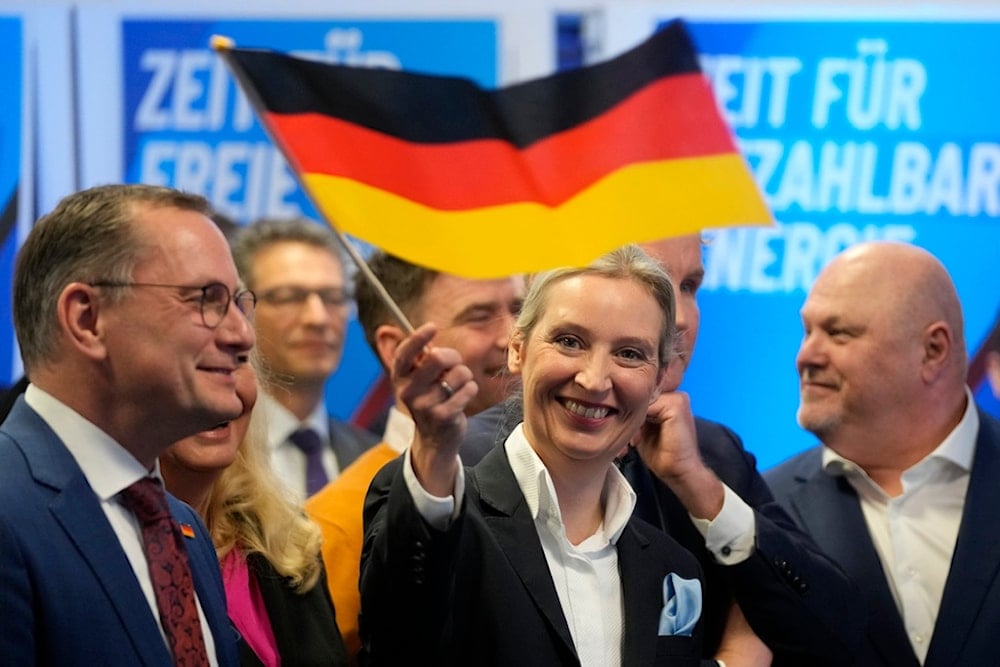AfD accuses Merz government of dividing Germany on Unity Day
As Germany marked 35 years of reunification, the right-wing AfD accused Chancellor Friedrich Merz's government of dividing the nation, exploiting economic and regional grievances to challenge the ruling coalition and test the political "firewall" meant to isolate extremist forces.
-

Leader of far-right AfD Alice Weidel waves a German flag at the AfD party headquarters in Berlin, Germany, Sunday, Feb. 23, 2025, after the German national election (AP)
The right-wing Alternative for Germany (AfD) accused Chancellor Friedrich Merz's government on Friday of deepening national divisions, issuing a sharply worded statement as the country marked the 35th anniversary of its reunification, a day meant to celebrate unity and shared identity.
"Today, the CDU government under Chancellor Merz is splitting the country with its policy. It creates divisions and builds barriers, excluding millions of citizens and voters simply because, from their point of view, they have the wrong opinion or vote for the wrong party. Instead of creating a prosperous environment, recent policies have sparked multiple crises and pushed the nation to the brink of collapse," the AfD said in a post on X commemorating German Unity Day.
35 Jahre Deutsche Einheit!
— AfD-Fraktion im Deutschen Bundestag 🇩🇪 (@AfDimBundestag) October 3, 2025
Wir Deutschen haben allen Grund, stolz auf diesen Tag zu sein. Die friedliche Revolution, die zum Fall der Mauer und zur Wiedervereinigung nach Jahrzehnten der Teilung geführt hat, war eine glückliche Sternstunde für Deutschland.
Unsere Nation hat… pic.twitter.com/DLNifpyiwA
Fractured Unity
Germany's official reunification on October 3, 1990, symbolized the end of decades of division between East and West, formally restoring the nation's sovereignty through the Moscow Treaty. Yet, thirty-five years later, the promise of unity appears to be faltering. Political and social divides between eastern and western regions have widened, reflected in the surge of support for the AfD in the east and growing distrust toward Berlin's political establishment.
The AfD's remarks underscore the escalating feud between the far-right party and Merz's Christian Democratic Union (CDU), which governs in coalition with the Christian Social Union (CSU). The Merz government continues to enforce a "firewall" policy that strictly prohibits cooperation with the AfD at every level of governance. While mainstream parties defend this firewall as a safeguard for democracy, the AfD denounces it as systemic exclusion, claiming it disenfranchises millions of voters who feel neglected by the political elite.
Populist Surge
The statement comes at a time when Merz's coalition faces internal strains and declining public confidence. Inflation, high energy prices, and contentious debates over migration have eroded trust in traditional parties. Meanwhile, the AfD has positioned itself as a populist alternative, channeling economic frustration and resentment toward the government, particularly in eastern states that once formed the German Democratic Republic (GDR).
The party's strategy appears to be paying off. In recent elections, the AfD captured over 20% of the national vote, becoming Germany's second-largest political force. In several eastern regions, it now leads local polls outright, a reflection of enduring economic disparities and perceptions of marginalization. These gains have raised alarms among European allies and German democrats alike, who warn that the AfD's rise could destabilize the postwar political order.
Cracking Firewall
Merz has faced mounting criticism from both within and outside his party for his handling of the AfD challenge. Earlier this year, a migration bill backed by AfD votes narrowly passed parliament, prompting accusations that the firewall policy is beginning to crack. Merz later reaffirmed his refusal to collaborate with the right but has struggled to maintain unity in his coalition amid pressure from conservative factions urging tougher stances on migration and energy.
The tensions come in light of broader transformations in German politics, where fragmentation and polarization are replacing the once-stable consensus that defined the post-reunification era. On Unity Day, as officials delivered speeches urging cohesion, the AfD seized the moment to accuse the government of betrayal, turning a day of national reflection into a battlefield over identity and belonging.
Read more: Poll shows record dissatisfaction with Chancellor Merz

 4 Min Read
4 Min Read








